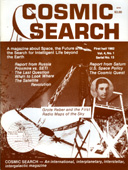![[NAAPO Logo]](../../Images/NAAPOsm.jpg) North American AstroPhysical Observatory (NAAPO)
|
|
Why Explore? Hail Columbia!
By: John Kraus
In my book "Big Ear", I relate how in a 1960 Commencement Address at a large university I said,
"If man no longer searches for knowledge and truth, he is no longer man."
Norman Cousins once commented that being asked why we explore is like having to apologize for our highest attributes one of which is that we are, by nature, creatures of exploration.
The roots and tendrils of a plant are its explorers. Without them the plant dies. Humanity too needs its explorers else it will wither and die.
We are one with the universe and the universe is one with us. We will not know us until we know the universe.
And to know the universe we need to get into space. Space is our great frontier awaiting exploration and utilization.
In this issue's "ABCs of Space" I point out that "NASA holds the key to our future more than any other federal agency. What NASA plans now and can subsequently accomplish will determine where the U.S. will be 10, 20, 50 and 100 years from now, not just in space but with respect to our entire economy.
When we spend money on space we are really spending it right here at home but even more important than that is the fact that if we don't spend it on space we won't have it to spend at home.
The countries of the past that advanced at home were the sea-faring nations that advanced at sea.
The countries of the future that will advance at home will be the space-faring nations that advance in space.
The epoch-making flights of the Vikings and Voyagers to Mars, Jupiter and Saturn and the sensational trips into orbit and back by the reusable Space Shuttle Columbia are extraordinary achievements in the history of mankind. But few people appreciate or understand the immense difficulty and enormous complexity of these feats.
I am dismayed at the critics of our space program who say that we should hold back, and who sieze on every problem that arises to support their contention.
Every advance has had its critics; every achievement has had its detractors. But who remembers now the ridicule heaped on Secretary of State Seward's purchase of Alaska from Russia? "Seward's Icebox" it was called. Or who remembers that the telephone used to be called "Bell's Folly". And when you flick a switch and a room floods with light, who recalls Edison's thousands of failures before a first success? Or on seeing the Columbia cleave the sky on lift off, who remembers the hundreds of failures Goddard experienced before his rocket rose above the trees? And if Wilbur and Orville Wright had postponed work on their flying machine because "heavier-than-air craft are not practical" we might only now be getting out of the open cockpit era. If we don't build the best we can now and learn from it we won't have a better device later.
Those who can, do. Those who can't, criticize.
If the U.S. is to advance at home it must advance into space. Other nations are moving out into space and the question now is:
Is the U.S. going to be the premier space-faring nation or just a second or third-rate one or even become an Earth-locked nation?
I say, Hail Columbia! Hail to our pioneering spirit! Let's look to the future and be supportive of our space program. Space beckons.
John Kraus
|
